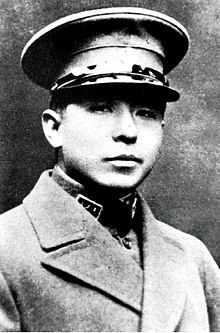Zhang Xueliang
| Zhang Xueliang | |
|---|---|
 |
|
| Native name | 張學良 |
| Nickname(s) | Young Marshal |
| Born |
3 June 1901 Taian, Liaoning, Qing Empire |
| Died |
15 October 2001 (aged 100) Honolulu, Hawaii, U.S. |
| Allegiance | |
| Service/branch | |
| Years of service | 1915–1936 |
| Rank | General of the Army |
| Commands held | Northeast Peace Preservation Forces |
| Battles/wars | |
| Spouse(s) | Yu Fengzhi (1916-1964) Edith Chao (1964-2000) |
| Relations | Zhang Zuolin (father) |
Zhang Xueliang or Chang Hsueh-liang or Chang Hsiao-liang (張學良; 3 June 1901 – 15 October 2001), occasionally called Peter Hsueh Liang Chang and nicknamed the "Young Marshal" (少帥), was the effective ruler of northeast China and much of northern China after the assassination of his father, Zhang Zuolin, by the Japanese on 4 June 1928. He was an instigator of the 1936 Xi'an Incident, in which Chiang Kai-shek, the leader of China's ruling party, was arrested in order to force him to enter into a truce with the insurgent Chinese Communist Party and form a united front against Japan, which had occupied Manchuria. As a result, he spent over fifty years under house arrest, first in mainland China and then in Taiwan. He is regarded by the Chinese Communist Party as a patriotic hero.
Born in Haicheng in 1901, Zhang was educated by private tutors and, unlike his father, felt at ease in the company of westerners. Zhang Xueliang graduated from Fengtian Military Academy, was made a Colonel in the Fengtian Army, and was appointed commander of his father's bodyguards in 1919. In 1921, he was sent to Japan to observe military maneuvers, where he developed a special interest in aircraft. Later, he developed an air corps for the Fengtian Army, which was widely used in the battles which took place within the Great Wall during the 1920s. In 1922, he was advanced to Major General and commanded an army-sized force, two years later he was also made commander of the air units. Upon the death of his father in 1928, he succeeded him as the leader of the Northeast Peace Preservation Forces (popularly "Northeast Army", 东北军 Dōngběi Jūn), which controlled China's northeastern provinces of Heilongjiang, Fengtian, and Jilin (Kirin). In December of the same year he proclaimed his allegiance to the Kuomintang (KMT).
...
Wikipedia
